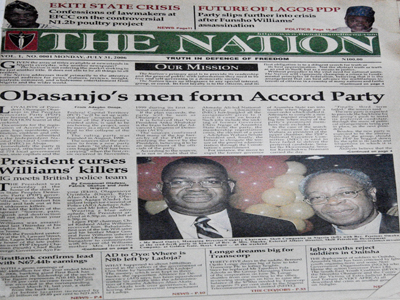
So far, so good. That is the story of The Nation
FOR centuries, newspapers have morphed into a major part of the human experience. As professors and philosophers of communication have noted, they represent history in a hurry. They tell the news of the rise of a president, his foibles and fall in the same way they record the trajectory of a disease like, say, malaria.
From age to age, they have become companions of the morning, read at home, on the farm, in palaces. As technology evolved, readers cuddled them first in carts then in cars. Today, many don’t flip the sheets but click to see and hear the news and form opinions, and they are still called newspapers.
They have seen the feudal epoch, the socialist tease as well as the tumbles and refinements of capitalism. In Nigeria, the newspaper was birthed in the turmoil of colonial umbrage. It fought the tyranny of a foreign overlord, witnessed the transformation from a communal to a capitalist people, and the dawn of a free Nigeria.
Since independence, the newspaper has seen the angst of the First Republic, the carnage of the Civil War, the long shadow of military rule with doubtful spices of civil democracy. Today, in what we call the fourth republic, the newspaper has been in the beach head of the Nigerian story.
It was to bring a special voice to the continuing Nigerian saga that a newspaper with a green mast head and with the stirring mantra, “Truth in Defence of Freedom,” sprouted into being.” The Nation newspaper, owned by the Vintage Press, was born in the topsy-turvy of Nigerian politics and dedicated to the idea that all citizens are entitled to liberty, food on their table, ethnic equality, career choice, the right to worship any god, the right to associate and be associated with and freedom from fear.
Underpinning this philosophy is a liberal-progressive ideology that recoils at any principle of inequality or hegemony, however gorgeously dressed.
Since July 31 2006, when this newspaper graced the newsstands, it has presented a potpourri of news, views, business, foreign affairs, entertainments, arts, and the softer underbelly of fashion, celebrity, sublime gossip. The newspaper sought out a serious template to tell its version of the Nigerian narrative.
We have not distorted any story; rather we have unearthed sordid developments in the country. Whether it was in the presidency, or in the state governments or in the far reaches of local governments, we have not fazed in telling the story of Nigeria.
We have also been conscious of the tone of our stories, weaving the Nigerian experience with an optimistic air without compromising a sense of the challenges ahead. Our editorials have been a special star in this publication, blazing the trail in tone, edge and format. We have been fulminating at the constant scourge of the Nigerian state: corruption. It has been a special part of the past decade.
We have reported corruption as well as the corruption of the anti-corruption crusade. We have exposed the mighty and the little man. We have excavated the process. We have shown the way forward. We have lamented that, since Nigeria became independent in 1960, we were a nation of great potential. Yet, today, Nigeria is a nation of great potential. It is a story of a nation in perpetual rigmarole, a cycling in a rut.
We have also shown disgust at deepening poverty. The widening gap between the rich and power, the ostentation of the glitzy class, the desperate backlash of the poor in the guises of militancy in the Niger Delta, the kidnap hysteria in the east now metastasizing around the country, the Boko Haram onslaughts and the impunity of herdsmen.
Most of all, our editorials have railed at the torpedoing of the rule of law. At every level of our national lives, we have seen impunity. It has happened in the exercise and lack of it of presidential powers. Governors have sometimes celebrated it and gotten away with it. Fathers have raped daughters. Police have killed innocents. Landlords have bilked tenants. Tenants have taken advantage of forgiving landlords. Businesses have overreached as sharks. Courts and judges have mocked the dignity of their callings.
For most part, the narrative unveils in the theatre of politics. Campaigns have been more about coercion and bribes than persuasion. Electoral machines are under the sway of moneybags. The idols of the tribe have left us with mutual distrust, and a call for restructuring.
At 10, we have managed to present a distinctive voice as an influential newspaper in the top ranks of Nigerian journalism, not only for today but for all time. We are not satisfied with Nigeria, so we shall never flag in our role as a warrior on behalf of the ordinary Nigerian. We shall continue to fight for equality, justice, rule of law, and a society that projects pride to the world.
We congratulate ourselves on being 10 to the extent that we have gained the ears of Nigeria and a right and liberty to continue to serve as the advocate for a true and just country.
END

Be the first to comment